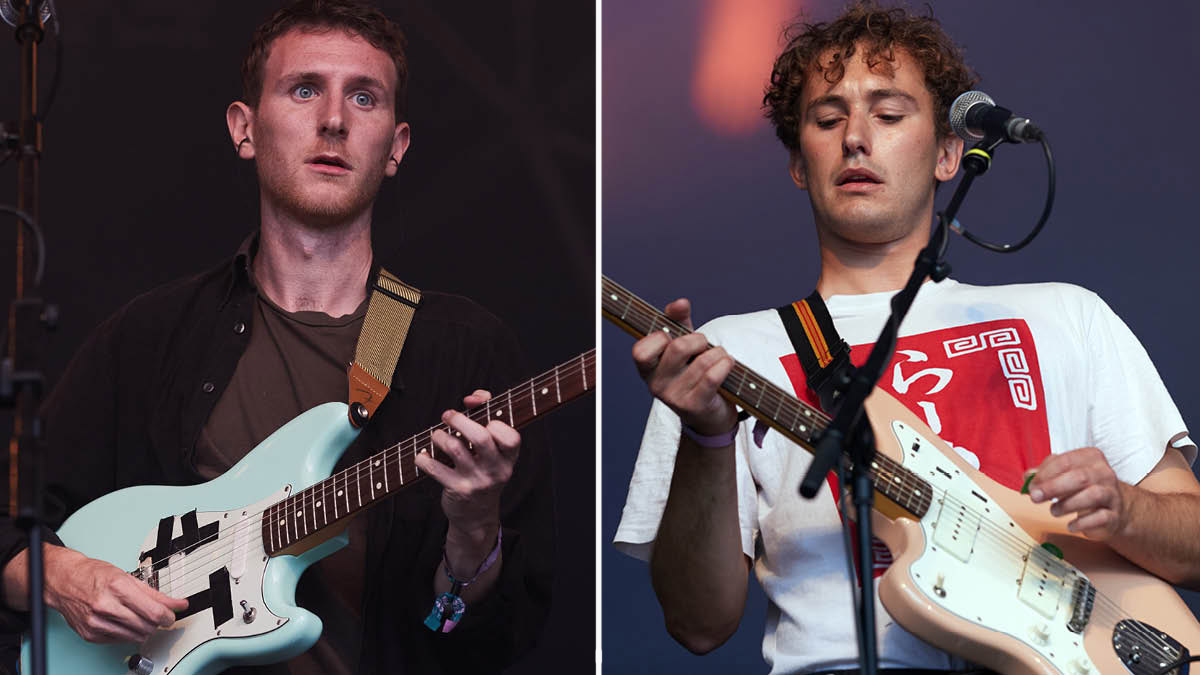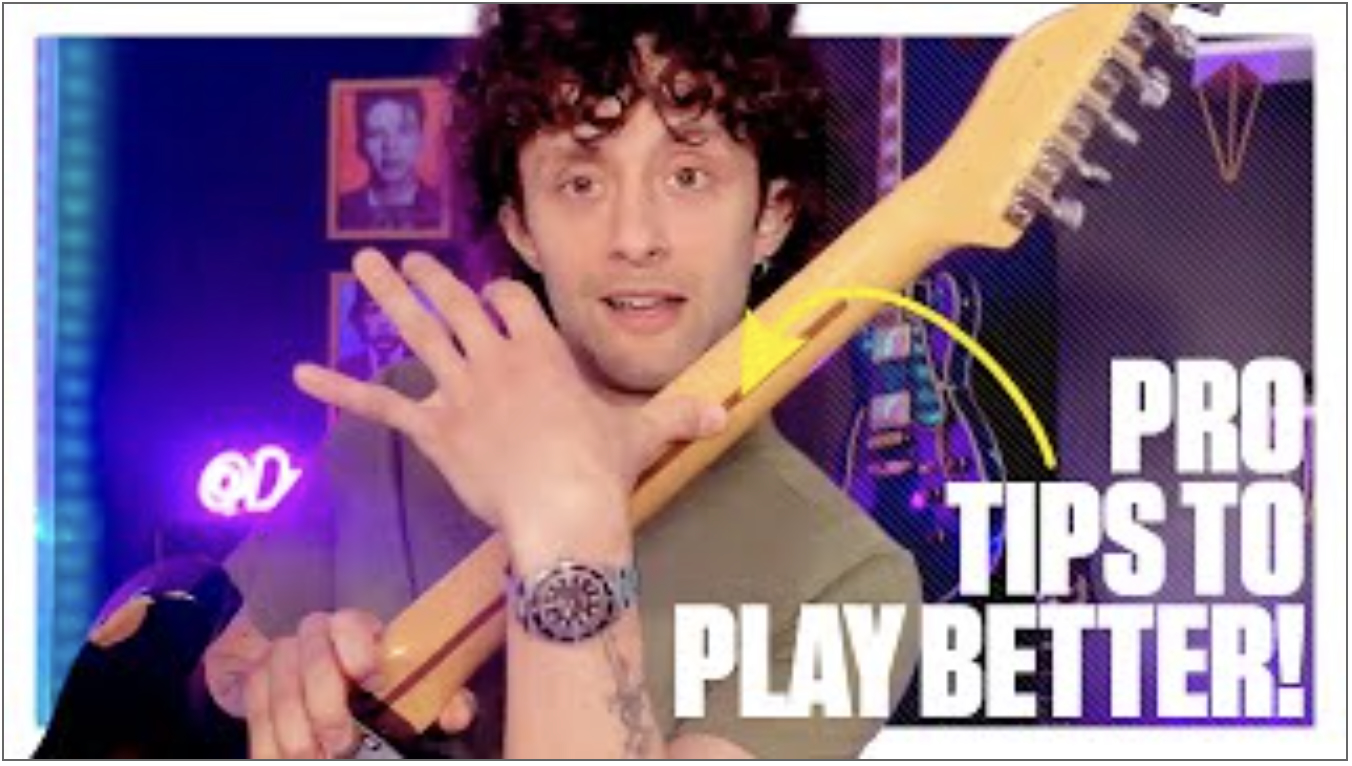“We’ve never wanted to come across like we’re doing things properly”: How Squid overcame imposter syndrome to develop a mesmerizing post-punk guitar sound
Louis Borlase and Anton Pearson on breaking guitar rules, swapping instruments and why they're not a ‘leave the overdrive pedal on’ kind of band

Squid are one of the UK’s most forward-thinking guitar groups, but when their guitar-playing multi-instrumentalist Louis Borlase talks about his earliest influences, a surprising name comes up. “I was obsessed with Bryan Adams for a while,” Louis says. “In school I performed Run To You in front of the year group, which is probably my musical highlight to date.”
Total Guitar’s self-depreciation detector is sounding, but Louis’ modesty is welcome nevertheless. In the last couple of years, he and his bandmates – fellow guitarist Anton Pearson, singer/drummer Ollie Judge, keyboardist Arthur Leadbetter and bassist Laurie Nankivell – have made the ascension from niche club venues like Brixton’s Windmill to outdoor festival stages such as Glastonbury.
As Anton describes the band’s early days: “Our first show was at The Verdict, a jazz venue in Brighton. We booked that show and then had to write music to fill the set. I don’t think we would have felt comfortable doing that for a ‘normal’ gig venue.”
This avant-garde approach clearly worked, as Squid’s love of Talking Heads-style art rock, krautrock, ambient electronics, odd time signatures and brass instruments landed them on famed dance label Warp Records for their debut album Bright Green Field – not bad for a band who seemed to suffer from a tinge of imposter syndrome in their early days.
As Louis recalls: “When we first started playing gigs, we’d be looking at other groups like, ‘They look like a proper band. They’re playing their instruments like a proper band.’ But one thing that’s been quite explicit is the fact that we’ve never really wanted to come across like we’re doing things properly – to know what ‘properly’ would mean!”
Speaking from the Warp Records HQ in London, Louis and Anton are discussing their expansive new album O Monolith, recorded in Peter Gabriel’s serene Real World Studios in Wiltshire…
You started writing songs for O Monolith during gigs after Bright Green Field. Did they come about from jamming in front of a live audience, or was it something that was written in parts and taken to gigs to flesh out?
Get The Pick Newsletter
All the latest guitar news, interviews, lessons, reviews, deals and more, direct to your inbox!
We once found ourselves jamming with two basses on stage in Copenhagen. But we haven’t managed to then take that idea into a focused writing environment and make the two-bass tune
Anton: “We had a tour called Fieldworks, which was a kind of socially distanced tour, and all we were allowed to do at the time. We used that as an opportunity to play some unfinished material. It’s not often that we’re writing things while the gig is happening, but it helps solidify ideas, so then you have the confidence to take it to another stage when you’re next in the rehearsal room. I don’t want us to seem like some kind of mad geniuses that just get on stage and write something and then it’s done. That’s not what we are!”
Louis: “Some of the songs were a bit clunky for quite a long time. But one thing that was nice about Fieldworks was that we had quite a few tracks that made it all the way through, and we recorded some of them, including Undergrowth and Swing (In A Dream).
“Those were instrumental tracks for quite a long time. So it was nice after having released Bright Green Field in 2021 as a finished piece of work, that we had these sketchy instrumentals for quite some time.”
How much did the songs change from those initial performances to when they were finally recorded?
Anton: “Most of them pretty massively, to be honest. For a lot of them, it felt like they became songs that were going to go somewhere for the first time on that tour.
Louis: “Some of them were finishing right up until the end, as well. Which is quite funny, because we had this amazing, state of the art studio, and we were like, ‘Today’s the day: we really need to try and finish that track – we need to record it!’”
Do you think the songs will continue to change and mutate on stage as you keep playing them? Or are you set on a final version of them now?
Louis: “I think they’ll change a lot. Some of them are quite hard to play – not that they’re virtuosically difficult. But I was thinking about how the vocals came a bit later on, we kind of built up these layers of possibility of what we could do.
“And then, when it’s finally finished and recorded, and some of them are in compound time signatures where Ollie is singing and drumming as well, it’s like, ‘We’ve made these songs quite hard for ourselves to play live.’
“So I think there will be some fun ways to push ourselves into trying different types of arrangements – stripped-back arrangements; electronic ones as well. But we haven’t got that far yet.”
Does working with synths change how you approach the guitar?
Louis: “I do think that since playing more keyboards in Squid that I’ve found myself just enjoying the guitar as a clean instrument more, and focusing on using different tunings and just letting the guitar speak for itself. I think for us as a band, texture is massively important as an approach to songwriting. Particular sounds are as important as a melody.”
You guys have been known to swap instruments on stage. Does this stem from who played what on the record?
Anton: “We record everything as a full-band live take, So usually, whoever’s playing something on stage has done that on the record.”
Louis: “We still haven’t got to the stage where we have a two-bass tune yet. We’ve always got two basses on stage; a right- and a left-handed one. I think we once found ourselves jamming with two basses on stage in Copenhagen. But we haven’t managed to then take that idea into a focused writing environment and make the two-bass tune.”
Like the Spinal Tap song Big Bottom, where three of them are playing basses at the same time…
Anton: “You shouldn’t let Spinal Tap stifle your creativity.”
Louis: “We should be allowed our two-bass moment!”
We look forward to hearing that. Neither of you play traditional ‘rhythm’ or ‘lead’. How do you know when to sit back to not get in each other’s way?
Louis: “Because our music doesn’t have a verse-chorus focus, it naturally lends itself to a kind of explorative improvisation across quite a linear structure. I think any musician finds it a challenge to find that balance of when to play versus when not to play. And I think when it comes to writing, we’ve gotten better over the years of being able to kind of just write counterparts.
“O Monolith is definitely a development on that from Bright Green Field, because we didn’t want it to be so much an album that was built around all sounds happening at once. Instead, we wanted it to be a bit more individual melodies that interlock.”
The album boasts both delicate, melodic playing and really fuzzed-out moments. Swing (In A Dream) has an almost-stoner metal riff halfway through, and there’s blown-out distortion on The Blades as well.
Louis: “We recorded the album with Dan Carey, and he’s a very fun person to work with. I think he does just collect lots of amps and he has lots of different distortions that he always brings out each time.
“He’ll go, ‘I know this is the right one for this tune!’ The [InterFax] Harmonic Percolator fuzz came out quite a lot. And then he’d just bought a Magnatone 1x12 combo, and that was really nice because no matter how hard you push it stays very soft-sounding as well.
“So I think doing the album with him, we liked to have a bit of fun trying out different guitar sounds, but it’s kind of just how the song goes. If there’s a loud moment, I think we do find ourselves saying let’s get nice and energetic and grungy. But I’d say 90 per cent of the time everything’s still kind of clean. I don’t think we're a ‘leave the overdrive pedal on’ kind of band.”
What gear did you use to track the record?
Anton: “I used a few different guitars. Most of it I did on Dan’s 1970s Strat, and I used a Rickenbacker 360. I've got a WEM Westminster [amp], and I don’t know the model, but I used that alongside a Swart amp. That was a nice blend of really bright and warm sounds.”
Louis: “I think I tracked most of it on my Jazzmaster, and I think Undergrowth and Devil’s Den and possibly Green Light – that was all on my Telecaster, and amp-wise, all Dan’s amps. Mostly on the Magnatone 1x12 and his tweed 1970s Mesa/Boogie, which I tend to use every time we work with him. And then like lots of the fuzzier moments were on his Supro, as well.”
You started writing O Monolith so long ago. Are you already thinking about the next thing?
Anton: “We’re always writing.”
Louis: “We’ve got to tell everyone in our team that we’re really focused on O Monolith, because that’s the only thing that matters to us right now as we’re halfway through the album campaign. But deep down we’re like, ‘These new tracks are sounding amazing!’”
- O Monolith is out now via Warp.
Stan is a Production Editor and writer for Total Guitar, a publication that he has been reading since the age of 10, which is partly responsible for his enduring love of the instrument. He also works for Computer Music and Future Music magazines, and has written for a number of Bristol-based blogs and zines since graduating from the University of South Wales in 2015. Stan is an alternative music enthusiast and has played in a number of indie bands, though he dreams of one day having a picking hand fast enough to form a death metal group. Wish him luck.
“I knew the spirit of the Alice Cooper group was back – what we were making was very much an album that could’ve been in the '70s”: Original Alice Cooper lineup reunites after more than 50 years – and announces brand-new album
“Such a rare piece”: Dave Navarro has chosen the guitar he’s using to record his first post-Jane’s Addiction material – and it’s a historic build





![[from left] George Harrison with his Gretsch Country Gentleman, Norman Harris of Norman's Rare Guitars holds a gold-top Les Paul, John Fogerty with his legendary 1969 Rickenbacker](https://cdn.mos.cms.futurecdn.net/TuH3nuhn9etqjdn5sy4ntW.jpg)





